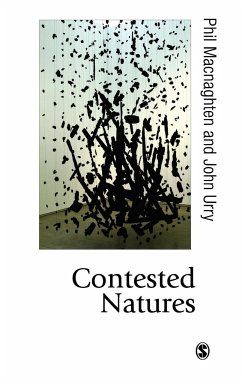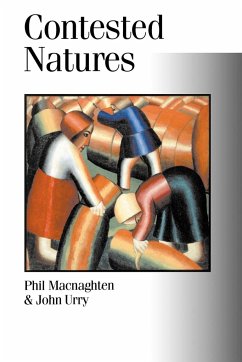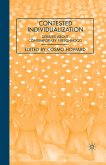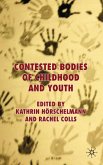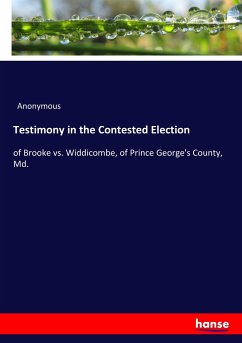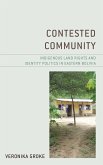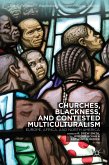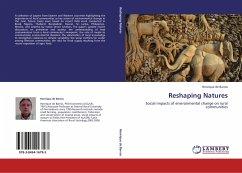Schade – dieser Artikel ist leider ausverkauft. Sobald wir wissen, ob und wann der Artikel wieder verfügbar ist, informieren wir Sie an dieser Stelle.
- Gebundenes Buch
- Merkliste
- Auf die Merkliste
- Bewerten Bewerten
- Teilen
- Produkt teilen
- Produkterinnerung
- Produkterinnerung
Demonstrating that all notions of nature are entangled in different forms of social life, the text elaborates the ways in which the apparently natural world has been produced from within particular social practices. These are analyzed in terms of different senses, different times and the production of distinct spaces.
Andere Kunden interessierten sich auch für
![Contested Natures Contested Natures]() Phil MacnaghtenContested Natures82,99 €
Phil MacnaghtenContested Natures82,99 €![Contested Individualization Contested Individualization]() Contested Individualization39,99 €
Contested Individualization39,99 €![Contested Bodies of Childhood and Youth Contested Bodies of Childhood and Youth]() Contested Bodies of Childhood and Youth39,99 €
Contested Bodies of Childhood and Youth39,99 €![Testimony in the Contested Election Testimony in the Contested Election]() B. P. PrattenTestimony in the Contested Election17,90 €
B. P. PrattenTestimony in the Contested Election17,90 €![Contested Community Contested Community]() Veronika GrokeContested Community136,99 €
Veronika GrokeContested Community136,99 €![Churches, Blackness, and Contested Multiculturalism Churches, Blackness, and Contested Multiculturalism]() Churches, Blackness, and Contested Multiculturalism39,99 €
Churches, Blackness, and Contested Multiculturalism39,99 €![Reshaping Natures Reshaping Natures]() Henrique de BarrosReshaping Natures46,99 €
Henrique de BarrosReshaping Natures46,99 €-
-
-
Demonstrating that all notions of nature are entangled in different forms of social life, the text elaborates the ways in which the apparently natural world has been produced from within particular social practices. These are analyzed in terms of different senses, different times and the production of distinct spaces.
Produktdetails
- Produktdetails
- Verlag: Sage Publications UK
- Seitenzahl: 320
- Erscheinungstermin: 1. Mai 1998
- Englisch
- Abmessung: 240mm x 161mm x 22mm
- Gewicht: 643g
- ISBN-13: 9780761953128
- ISBN-10: 0761953124
- Artikelnr.: 36161971
- Herstellerkennzeichnung
- Libri GmbH
- Europaallee 1
- 36244 Bad Hersfeld
- gpsr@libri.de
- Verlag: Sage Publications UK
- Seitenzahl: 320
- Erscheinungstermin: 1. Mai 1998
- Englisch
- Abmessung: 240mm x 161mm x 22mm
- Gewicht: 643g
- ISBN-13: 9780761953128
- ISBN-10: 0761953124
- Artikelnr.: 36161971
- Herstellerkennzeichnung
- Libri GmbH
- Europaallee 1
- 36244 Bad Hersfeld
- gpsr@libri.de
Phil Macnaghten is a human geographer with broad interests in the governance of science and technology, responsible innovation, the sociology of the environment, deliberative methodology and discourse analysis. His early research focused on the cultural dimensions of environmental policy and their intersection with everyday practice. He developed a form of engaged scholarship, combining conceptual work with critical policy development in the domains of rural policy, sustainability policy, technology policy, forestry policy and environmental behaviour change. This work has been taken forward in recent years through an Institute of Advanced Studies project: ¿New storylines for living with environmental change: citizens' perspectives¿ (2011 - 2012). More recently, Phil has worked on the governance of emerging technology and societal engagement. This includes the ESRC study on nanotechnology and upstream public engagement (2004 - 2006), and the European DEEPEN project (Deepening Ethical Engagement and Participation in Emerging Technologies) (2006 - 2009). The DEEPEN project constituted Europe¿s leading consortium on the ethical dimensions of emerging nanotechnologies and their implications for civil society, governance and scientific practice. The research contributed to the philosophy that underpins two European initiatives: (1) the European Code of Conduct for Responsible Nanosciences and Nanotechnologies Research Initiative and its emphasis on responsible development and anticipatory governance; and (2) the Responsible Research and Innovation Initiative and its emphasis on embedding broader societal goals into the practice of science itself. The research further contributed to UK national policy initiatives on synthetic biology, geoengineering and responsible innovation. This work has led to an on-going research project for the UK research councils designing a ¿draft framework for responsible innovation¿. Phil was Founding Director of the Institute of Hazard, Risk and Resilience (IHRR) (2006 - 2008), a Demos Associate (2004 - 2008), a Visiting Professor at the Federal University of Santa Catarina in Brazil (2009), a Fellow of the Royal Society of Arts (2008 - ), a member of the UK's EPSRC's Societal Issues Panel (2010 - 2011), a member of EPSRC's Strategic Advisory Network (2011 - ) and chair of the Stagegate panel of the RCUK-funded Stratospheric Particle Injection for Climate Engineering (SPICE) project. He has recently co-authored (with Richard Owen) a comment piece for Nature, ¿Good governance for geoengineering¿.
PART ONE: RETHINKING NATURE AND SOCIETY
Introduction
Nature and Society
A Historical Context
A Sociology of Environmental Knowledges
Cultural Readings of Nature
Environmental Bads
Environmentalism and Society
Conclusion
PART TWO: INVENTING NATURE
Introduction
Postwar Reconstruction and Rational Nature
To Nature as Environment
Inventing British Environmentalism
Post-Rio Environmentalism
Conclusion
PART THREE: HUMANS AND NATURE
Introduction
The Polling Culture and the Environment
A Relational Framework
Rhetoric, Identity and Nature
Globalization, Agency and Trust
PART FOUR: SENSING NATURE
Introduction
Nature, Space and Vision
Nature and the Other Senses
Conclusion
PART FIVE: NATURE AND TIME
Introduction
The Social Sciences and Time
Different Times in and of Nature
Memories of Nature
PART SIX: NATURE AS COUNTRYSIDE
INTRODUCTION
Producing Countryside Spaces
Landscapes of Discipline
The Countryside and Ambivalence
Spatial Practices in the Countryside
PART SEVEN: SUSTAINING NATURE
Introduction
Sustainability as New Public Discourse
Sustainability Discourse and Daily Practice
Framing Environmental Concerns
Conclusion
PART EIGHT: GOVERNING NATURE
Summarizing
Mad Cows
Globalizing the Nation
Governing Nature
Introduction
Nature and Society
A Historical Context
A Sociology of Environmental Knowledges
Cultural Readings of Nature
Environmental Bads
Environmentalism and Society
Conclusion
PART TWO: INVENTING NATURE
Introduction
Postwar Reconstruction and Rational Nature
To Nature as Environment
Inventing British Environmentalism
Post-Rio Environmentalism
Conclusion
PART THREE: HUMANS AND NATURE
Introduction
The Polling Culture and the Environment
A Relational Framework
Rhetoric, Identity and Nature
Globalization, Agency and Trust
PART FOUR: SENSING NATURE
Introduction
Nature, Space and Vision
Nature and the Other Senses
Conclusion
PART FIVE: NATURE AND TIME
Introduction
The Social Sciences and Time
Different Times in and of Nature
Memories of Nature
PART SIX: NATURE AS COUNTRYSIDE
INTRODUCTION
Producing Countryside Spaces
Landscapes of Discipline
The Countryside and Ambivalence
Spatial Practices in the Countryside
PART SEVEN: SUSTAINING NATURE
Introduction
Sustainability as New Public Discourse
Sustainability Discourse and Daily Practice
Framing Environmental Concerns
Conclusion
PART EIGHT: GOVERNING NATURE
Summarizing
Mad Cows
Globalizing the Nation
Governing Nature
PART ONE: RETHINKING NATURE AND SOCIETY
Introduction
Nature and Society
A Historical Context
A Sociology of Environmental Knowledges
Cultural Readings of Nature
Environmental Bads
Environmentalism and Society
Conclusion
PART TWO: INVENTING NATURE
Introduction
Postwar Reconstruction and Rational Nature
To Nature as Environment
Inventing British Environmentalism
Post-Rio Environmentalism
Conclusion
PART THREE: HUMANS AND NATURE
Introduction
The Polling Culture and the Environment
A Relational Framework
Rhetoric, Identity and Nature
Globalization, Agency and Trust
PART FOUR: SENSING NATURE
Introduction
Nature, Space and Vision
Nature and the Other Senses
Conclusion
PART FIVE: NATURE AND TIME
Introduction
The Social Sciences and Time
Different Times in and of Nature
Memories of Nature
PART SIX: NATURE AS COUNTRYSIDE
INTRODUCTION
Producing Countryside Spaces
Landscapes of Discipline
The Countryside and Ambivalence
Spatial Practices in the Countryside
PART SEVEN: SUSTAINING NATURE
Introduction
Sustainability as New Public Discourse
Sustainability Discourse and Daily Practice
Framing Environmental Concerns
Conclusion
PART EIGHT: GOVERNING NATURE
Summarizing
Mad Cows
Globalizing the Nation
Governing Nature
Introduction
Nature and Society
A Historical Context
A Sociology of Environmental Knowledges
Cultural Readings of Nature
Environmental Bads
Environmentalism and Society
Conclusion
PART TWO: INVENTING NATURE
Introduction
Postwar Reconstruction and Rational Nature
To Nature as Environment
Inventing British Environmentalism
Post-Rio Environmentalism
Conclusion
PART THREE: HUMANS AND NATURE
Introduction
The Polling Culture and the Environment
A Relational Framework
Rhetoric, Identity and Nature
Globalization, Agency and Trust
PART FOUR: SENSING NATURE
Introduction
Nature, Space and Vision
Nature and the Other Senses
Conclusion
PART FIVE: NATURE AND TIME
Introduction
The Social Sciences and Time
Different Times in and of Nature
Memories of Nature
PART SIX: NATURE AS COUNTRYSIDE
INTRODUCTION
Producing Countryside Spaces
Landscapes of Discipline
The Countryside and Ambivalence
Spatial Practices in the Countryside
PART SEVEN: SUSTAINING NATURE
Introduction
Sustainability as New Public Discourse
Sustainability Discourse and Daily Practice
Framing Environmental Concerns
Conclusion
PART EIGHT: GOVERNING NATURE
Summarizing
Mad Cows
Globalizing the Nation
Governing Nature

